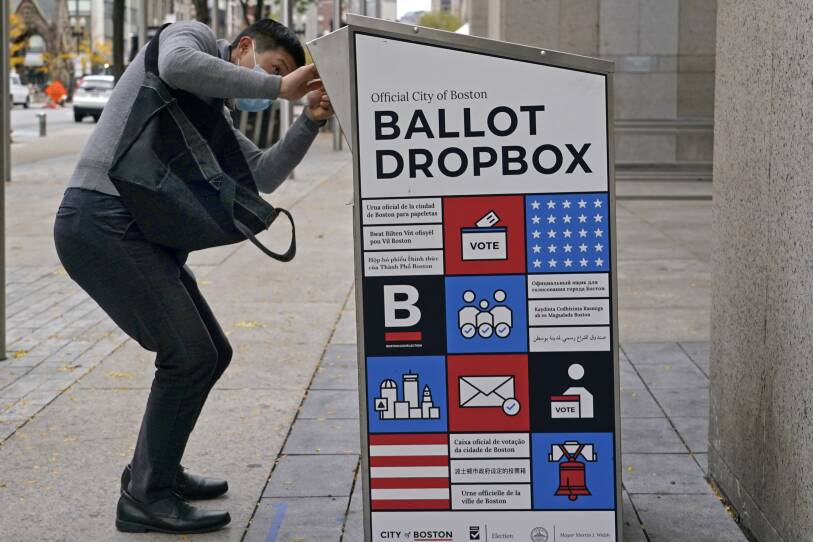Deception in politics is a tale as old as time. And with a reduction in local news organizations, getting reliable information often falls on the individual voter.
But even with the hollowing out of local journalism, some experts told GBH News, there’s more information now than ever about the candidates on your ballot. The question is simply who to trust.
“You’re [not] going to find a shortcut, like a little cool online quiz, that’s going to get you to the right answer,” said Eitan Hersh, a professor of civic studies at Tufts. “The wonderful thing about local politics, but also the burden of it, is that it is very personal.”
You might get a sense of candidates through social media posts or yard signs from neighbors you generally agree with — as well those with opposing viewpoints, as some voters told us. For more information on the candidates’ stances, though, you can often find voter guides or forums hosted by local organizations.
Get the basics from your local government website.
There’s nowhere better to get the general information on who’s running, and when, where, and how you can vote.
This list from the secretary of state’s office will tell you if elections are coming up in your city or town. From there, you can find your local government’s website for more information, including sample ballots and early voting hours.
Boston's 2023 City Council elections
Visit the city's website to find early voting hours, what district you're voting in, or register to become a poll worker.
Ron Bell, the founder and executive director of the Boston-based voter registration nonprofit Dunk the Vote, also urged people to double check their polling sites this year on the city of Boston website.
“Because the lines have been redrawn, make sure that you know exactly where your voting location is located,” Bell said. “You do not want to be turned away on Election Day because you did not have the right polling location.”
Vet your options in contested races.
Experts underscored the value of getting information from several sources. It’s useful not just for information on which candidates most line up with your values, but also to verify basic information about a candidate’s stances.
“Just as, when we get a medical diagnosis, it’s always good to get a second opinion or maybe a third opinion: triangulating your information, confirming that what you just read or heard or saw is then true,” said Rachael Cobb, chair of Suffolk University’s political science and legal studies department.
“The wonderful thing about local politics, but also the burden of it, is that it is very personal.”Eitan Hersh, a professor of civic studies at Tufts
See what nonpartisan groups say.
For information on the candidates’ stances, many experts suggested voter guides produced by local organizations.
Several experts specifically look to the League of Women Voters, a group that has long put out such resources.
For municipal elections, Patricia Comfort, the Massachusetts league’s executive director, pointed to guides put out by their partners at Massachusetts Voter Table. Candidates from Boston, Worcester, Quincy, Springfield, Lawrence, Lynn and Haverhill answered questions for the organization’s guides on this fall’s municipal elections.
Go to candidate forums, or watch them from the comfort of your home.
Local organizations and TV stations will often host forums — which differ from debates in that the candidates don’t always go back and forth with each other. Those forums are sometimes devoted to a single topic that’s lined up with the host organization’s priorities.
Comfort said many of her organization’s 44 local chapters in Massachusetts held forums this fall — like in Framingham, where candidates for two contested district races spoke over Zoom.
Livestreamed forums are often preserved online for voters to watch whenever their schedule permits.
Find out who’s getting endorsed by whom, and why.
If there are issues you really believe in, seek out local groups that share your values and check to see who they endorse.
For Hersh, when he lived in Brookline, he often relied on a housing-oriented nonprofit for their local endorsements.
Cobb has mixed feelings. Sometimes, she warns, candidates will withdraw their names from consideration if they don’t completely align with the group peddling the endorsement.
“I would go to endorsements if you really believe in an organization that is doing the endorsing,” Cobb said. “It’s the local level. So you could even reach out to the endorsing organization and say, ‘Look, why not endorse this person?’ They’ll tell you.”
Survey social media.
Joining local Facebook groups can give insight into the behavior of a candidate’s supporters, or even the candidates themselves. But because there’s very little, if any, moderation on social media, take information from those sites with a grain of salt.
“Oftentimes there’s groups in communities — like, a ‘Local Town of Whatever’ Nextdoor or Facebook group,” Shannon Jenkins, professor of political science at UMass Dartmouth, said. “Those groups can be sources of misinformation. ... Here in our local community, people will say, ‘This person is corrupt because they did this.’ And it’s completely not true.”
“Social media is terrible for facts.”Erin O’Brien, associate professor at UMass Boston’s political science department
Mike Hanmer, the director of the University of Maryland’s Center for Democracy and Civic Engagement, points out it’s also not always obvious who has what agenda, much like TV ads for candidates that have the funding provided by an entity with an ambiguous name.
“I’d say social media is terrible for facts,” Erin O’Brien, an associate professor at UMass Boston’s political science department, said. “You can find some basics out there — especially some of these local officials [who] will have Twitter handles themselves.
“If they choose to present themselves with anger, vitriol, negative partisanship, that might be a candidate you walk away from — or for some voters, that might be music to their ears,” she added.
Talk to neighbors and people you trust.
Bell said there’s value in meeting the candidates and seeing what they put out there about themselves. But talking to the people who know them can be a lot more useful when you’re looking for a candidate with integrity, and who lines up with your values.
“Candidates’ forums, read up on them ... on their website — and talk to other people,” Bell advised. “People that they have been in contact with, people that they grew up with, people they’ve worked with over the years. You get a good sense of: What are other people saying about this candidate?”
Hersh agrees: the best way to know who you align with in local politics isn’t about the ballot box, it’s about being connected to your community. Hersh recommended, above all, finding local political “influencers” who you trust.
But that’s something he knows can be hard for young people, renters, and those who might not have affinity group ties such as schools and religious institutions.
“There are a lot of people out there for whom they don’t have easy access to a social network that’s tied into politics,” he said. “You might say, ‘Well, they should learn online.’ I think another piece of advice — that’s probably healthier — is, no, they should probably get in community enough that they know who they want to be their influencer.”
And, when you can get it, a reliable news source is still a good option.

Comfort, in Marblehead, consults the Marblehead Current and the Marblehead Reporter.
Cobb, in Cambridge, reads the Cambridge Day and Harvard’s student newspaper, The Crimson.
O’Brien checks the Patriot Ledger for information on races in Weymouth, where she lives. But she’s not just looking for their track record.
“I will go to the local paper and just Google search their names there to see what kind of statements, if any, come up,” she said. “If nothing comes up about them, I’m like, ‘Wow, they were probably pretty ineffective.’”
The bottom line? Read and watch widely and critically, talk to people, and rely on the individuals and organizations you trust. And try to get information straight from the horse’s mouth, too — in addition to candidates’ websites, many of them can be reached for questions by phone or found in person drumming up support for their campaign.








